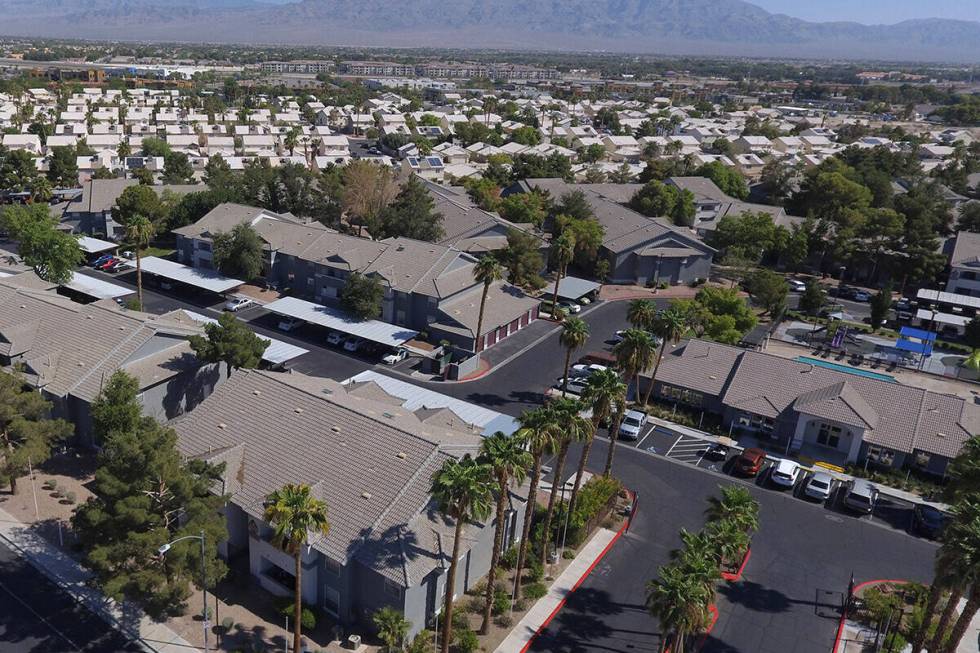‘We need more apartments in a bad way,’ says top Las Vegas broker

Jeffrey Swinger, who has worked in the Las Vegas apartment game for a quarter century, said the need for more multifamily units in the valley is definitive.
“We need more apartments in a bad way,” said Swinger, an executive vice president for multifamily investment sales with Colliers International.
Colliers data shows that for the past 20 years, the Las Vegas Valley has been adding approximately 6,000 apartment rental units per year, and this year will add 4,000, then 8,000 next year. This would be in line with the average, and Swinger said the idea that there is a boom of units expected to hit the market is overblown — and in fact, the market may be heading the other way.
“We are on pace right now for what we have averaged the past 20 years. Now, you combine that with the fact that Vegas is still adding net people, particularly from California, and you add in the fact that the single-family housing market and the condo market is completely screwed up, it’s unaffordable. That is going to create more and more renters.”
On top of this are unfavorable macro economic conditions, added Swinger, which include high interest rates dampening construction, creating a reluctance for developers to start building much needed multifamily projects in the valley. But he said Las Vegas isn’t alone, this is a national trend.
“We’re probably going to have a period of about two years where nothing is built, so it’s going to get even worse. Rents are not going to go down, (Colliers) has rents on our latest report flat for the most part, and in 2024, it is flat to slightly up.”
Colliers International’s third-quarter data shows 1,570 units came onto the market, which is an uptick from the same time frame last year. Properties were completed all around the valley from Henderson and North Las Vegas to Summerlin. There are also 10,737 units under construction within all of the major submarkets in the valley except Green Valley and the northeast. Colliers noted the largest expansion of the multifamily market in the near future will occur in the southwest, North Las Vegas and Henderson.
Las Vegas real estate has been on a roller coaster ride since the start of the pandemic when the Federal Reserve slashed the overnight funds rate close to zero to stimulate the economy during the pandemic. This kicked off both a building and buying boom in terms of real estate, which was curtailed starting in March of last year when the Fed started aggressively raising interest rates to stem runaway inflation, putting it up to a level not seen since the mid-2000s.
National data does show some signs of promise however, as Rent Research’s October report shows that “rent levels dropped in September for the first time in six months after coming within $2 of the historical high record a month before.”
John McClelland, a commercial broker with Coldwell Banker Commercial Premier who works primarily in the luxury multifamily market, said numbers from real estate market analytics company CoStar are showing similar patterns when it comes to the Las Vegas Valley, and that right now there is “mild negative absorption,” which means more space is being vacated than leased.”
“The thesis of nothing being built for a while probably has validity, largely due to the financing reasons,” he said. “We will probably be below average for absorption this year so a flat to mild rise in rents probably makes sense, though concessions should remain prominent.”
Swinger said apartment vacancy rates in the Las Vegas Valley, which currently sit at 7.1 percent — have inched up this quarter — and are higher than they were this time last year by 1.65 percent — but it is not enough to turn the market around.
“We’re just not adding enough supply to keep up and keep rent down,” he said. “The problem is what the Fed is doing right now. Interest rates are so high that the capital markets are frozen. Builders should be able to build, and they are not right now. So what we’re looking at right now is completing what we already have on the table, but new stuff going forward, it’s all stalled.”
Contact Patrick Blennerhassett at pblennerhassett@reviewjournal.com.